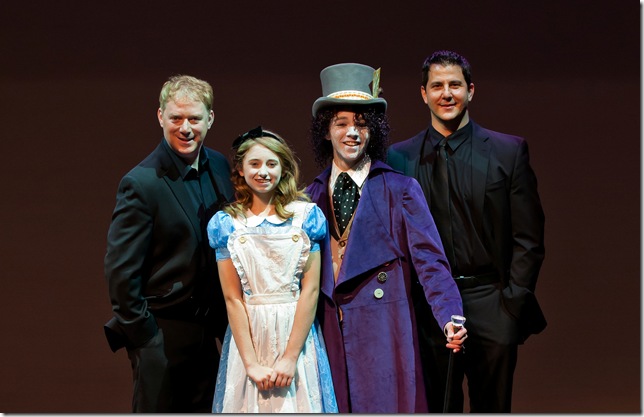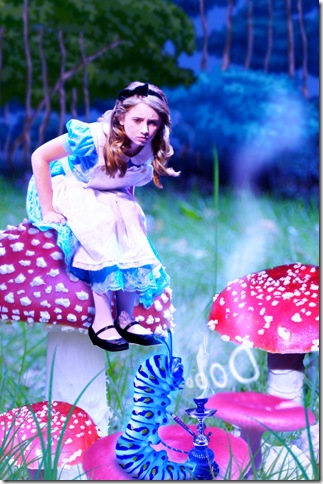Ask John Mercurio about way he approaches his craft as a composer of musicals, and one word keeps coming back: Storytelling.
Partly that’s because he writes book and lyrics as well as music, but the idea also is central to his creative process.
“I think for me, the way in, whether it be book writing, music writing or lyric writing, is always telling a story. That’s my thing. That’s the only thing I ultimately care about. Some people say, ‘Who says you can do all three?’ And it’s not that I suddenly feel I can do this, it’s that I’m a storyteller,” he said. “I have this story to tell, and then I have to find the medium.”
Tonight, the Maltz Jupiter Theatre premieres an original children’s musical created for the company by Mercurio and his longtime friend and collaborator, Maltz artistic director Andrew Kato. Called Through the Looking Glass, the work is based on the two classic Alice in Wonderland books by Lewis Carroll. The idea and scenario was Kato’s and he is directing the musical, while Mercurio handled book, lyrics and music.
The show stars 28 children and teenagers selected from about 400 young people who tried out during a mass audition called First Step to Stardom last spring. In the lead role of Alice is Emily Rynasko, 14, who lives in Hobe Sound. Another Treasure Coast resident, 17-year-old Nicky Wood of Port St. Lucie, plays the Mad Hatter, and the Queen of Hearts is performed by Jupiter resident Charly Hamann, who’s 16.
The hourlong musical, which will be seen twice today in morning matinees for pre-selected school audiences and again tonight for the general public, will be added to the Maltz’s general repertory, Kato said. The show is designed to be a recurring holiday event, and will make a return appearance around Thanksgiving 2013, he told an audience at a special preview talk Wednesday at the theater on Route A1A.
“Kind of like the way a lot of (theaters) do ‘Christmas Carol,’ we thought, ‘Let’s create a work for families, a work that would be family-friendly. Let’s create it, perform it, then store it and bring it out every year for a couple of years,’” Kato said.
At the special preview Wednesday, key production personnel explained some portion of their work on the project. In addition to Mercurio, who talked about how the show came to be, costume designer Leslye Menshouse explained the inspiration for the Mad Hatter’s jacket and Alice’s dress, while puppet master Jenna Hoefert described how she went about creating a singing black-eyed Susan.
Sound designer Marty Mets revealed in an entertaining anecdote that the voice of the Jabberwock was created by recording and then slowing down the growl of a dog named Harry (who was on stage Wednesday), a dog that doesn’t particularly like Mets.
“He was very good. He did his best growls directly under the mic,” Mets said, to lots of audience laughter.
Critical to the work’s shape is that it has a contemporary scenario that takes Alice on an emotional journey, Mercurio said.
“The Alice material, although it’s chock-full of wild, wacky and interesting characters, there’s no inherent story there. It’s just a series of fun adventures,” he said. “It’s great, but I don’t get excited about that. I need to know: What’s the journey? What’s the arc of the piece? The answer was, we had to make one up.”
The idea was to make Alice a contemporary adolescent, and a misfit with artistic leanings who is at a crossroads in her young life.
“She’s bullied in school. She’s very creative – she makes these sculptures that are totally outlandish and spiky and sort of modern, and everyone else is making little papier-mâché puppies and kittens – and she just doesn’t feel like she fits in anywhere. People pick on her, and so a result, she has to do some soul-searching … and she goes through the mirror,” he said.
In each adventure with the denizens of Wonderland, she learns something about herself, Mercurio said. In the original tale, Alice simply plays croquet the way the court plays it (with flamingos as mallets), but in this musical she has five minutes to create a way to play the game, or it’s off with her head.
“She puts it together, and she realizes: She’s resourceful,” Mercurio said.
An emphasis on social message is common to all the musicals Kato and Mercurio have created together; Through the Looking Glass is the fifth. Academy, a Kato-Mercurio musical about bad behavior at a prep school, won plaudits at the New York Musical Theater Festival in 2009 and at the Daegu International Musical Festival in South Korea, and was produced in 2010 at the Maltz.
Mercurio, 44, brings to the task more than 20 years of experience in the New York theater community, and a stellar academic musical pedigree. He grew up in North Palm Beach, where he began pursuing music as a pianist. He majored in music at the prestigious Eastman School of Music in Rochester, N.Y., where he studied with Samuel Adler, Warren Benson and Christopher Rouse.
Next, he earned a master’s in composition at New York University, studying with Milton Babbitt, George Perle and Louis Karchin, and had completed all of his doctoral work except for the written thesis (an examination of Stravinsky’s ballet scores) when he decided to shelve that effort and pursue composition full-time.
Truth to tell, he’d had more than an inkling of that path because during his time at NYU, he’d spent much of his time exploring his interest in musical theater. At Eastman, he won the Charles Strouse award for musical theater, which was funded by and named after the celebrated Broadway composer (Annie, Bye Bye Birdie, Applause), an Eastman grad.
“Since I was 13 I’d been in love with musicals and writing shows. Andrew and I wrote our first show when I was 16. So there was always this sense that I love classical music, and I love musical theater,” he said, but he realized his loyalties were divided. “I felt like I had a mistress. I would run off to the BMI Musical Theatre Workshop and take that class there … So here I was, studying with George Perle during the day and sneaking off to study musical theater after that.”
Mercurio spent years in New York doing vocal coaching and teaching while working on theater projects, and his credits include Glimpses of the Moon, a Jazz Age musical based on a novel by Edith Wharton, which he wrote with lyricist Tajlei Levis. That show won excellent reviews in its first run at the Oak Room of the Algonquin Hotel in New York, and a cast album was released earlier this year.
Through the Looking Glass is described as a pastiche score, and there are production numbers written in gospel, folk (The Walrus and the Carpenter) and softshoe manner. But two of the songs heard in concert performance Wednesday are written in an attractive contemporary pop-rock theater style.
What I’m Going Through, a duet for Alice (Rynasko) and her mirror image, sung by 13-year-old Abbie Levasseur of Jupiter, owes some of its drive to a kind of early Motown feel in the initial verse, and I Believe, a song for Alice’s elder sister Robin (Hamann, who becomes the Queen of Hearts in Wonderland) has a bluesy verse before expanding out into a big pop ballad of affirmation; in this case, Robin explaining the positive reasons that she’s so hard on her sister.
The three girls sang powerfully and well Wednesday, and in keeping with the American Idol/Glee stand-and-belt pop fashion that has won the current theatrical west. Many of today’s musicals have rock-flavored scores, and finding a good musical language that won’t date readily is a challenge, Mercurio said.
“I think theater music always reflected this time which it came from. That worked great until we got to the 60s, and then suddenly, when there was this major revolution with pop sound, musical theater was left saying: What are we supposed to do? We were always pop music and now we’re not. Our sound sounds so old-fashioned,” he said. “And I think, actually, from the 60s on, musical theater has been in a sort of flux as far as finding its own musical sound.
“Inherently, the form of rock and pop music does not work well in the theater. Rock and pop is all about repeating. You repeat the verse, you repeat the chorus, and by definition, there’s not a dramatic structure to it. You don’t end up anywhere different. Theater lyrics are all about: Start here, and you end up somewhere else,” he said.
The task then becomes wedding dramatic lyrics to pop’s musical lingua franca.
“‘I Believe’ is a very pop song. The melody feels pop, the form is pop. Except the lyrics do not repeat, and by the end, it’s different,” he said. “I get excited about finding a way to meld those two forms.”
The idea of transforming one thing into something different is not just a standard part of the artistic mission. It also reflects the emotional journey of Alice in Through the Looking Glass, and Mercurio hopes that message gets across.
“Sometimes with kids’ pieces, it can be so much like, ‘You’re OK the way you are,’ and that’s fine, but I will say the things that made me a freak and caused me great pain when I was a kid, I’m so grateful for now,” he said. “They become the source of tremendous riches. It’s because of that that I was forced to see things in a different way … I think it’s important to celebrate your freakishness as a good thing. It’s not just, ‘It’s my scar, and I’m proud of it.’ No, it actually could be something you should be grateful for.”
Through the Looking Glass begins at 7:30 p.m. today. Tickets are $20 for adults and $15 for children. Call 561-575-2223 or visit jupitertheatre.org.

